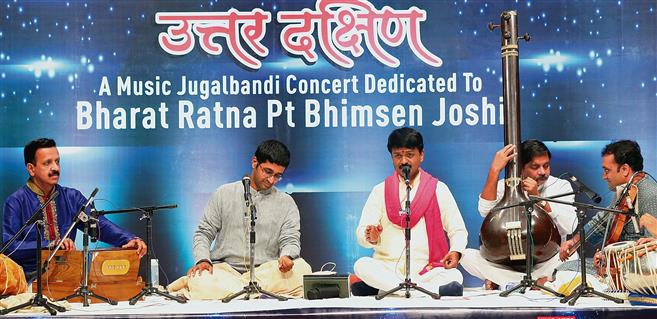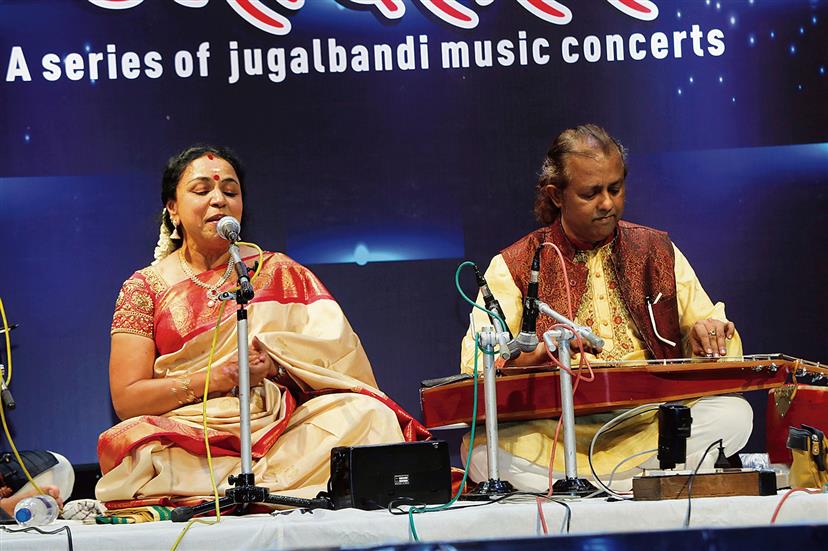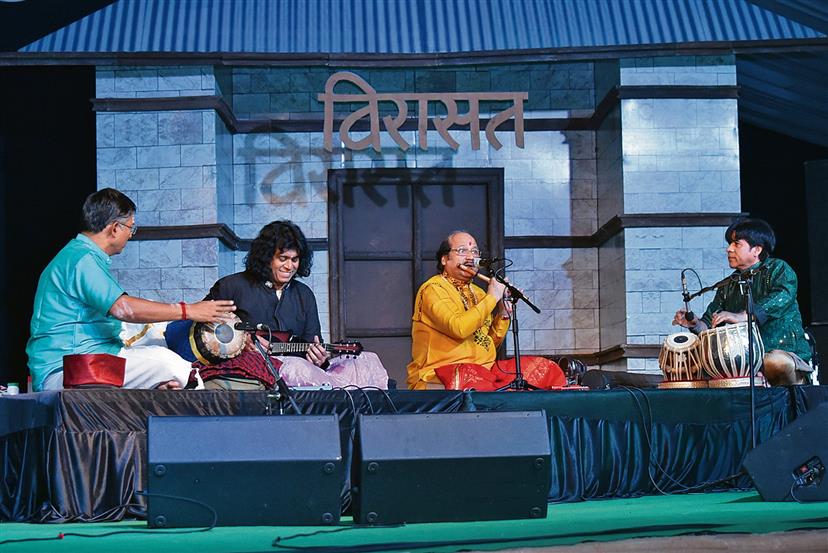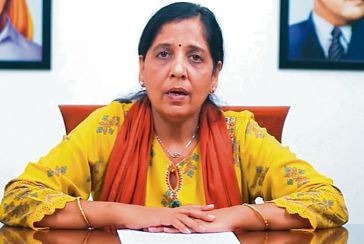
Jugalbandis between Carnatic vocalist Abhishek Raghuram and Kirana gharana singer Jayateerth Mevundi are a delight to watch.
Shailaja Khanna
India is the only country in the world which has two distinct systems of classical music — one from the North, also termed Hindustani, and the other from the South, called Carnatic. In fact, in the Indian context, the concept of sound itself is unparalleled: we believe that sound (naad) was created before anything else. This belief gives music a huge role in the process of one’s evolution, something no other musical tradition in the world has. It is no wonder that we have an over 2,000-year-old written tradition of Indian music, added to over the centuries, which is still available to us.
The division of style and thought in the two systems of music happened gradually, perhaps around 700 years ago. We do not have records of collaborations between musicians of the two systems in earlier times, but from the last century, these interactions have become frequent.

Two noteworthy jugalbandis (duets) of our times have been between vocalists Bhimsen Joshi and M Balamuralikrishna, and more unusually between Kishori Amonkar and Balamuralikrishna; due to the difference of pitch between male and female voice, the latter are rarer. Incidentally, both Amonkar and Balamuralikrishna sang in ‘C’, a compromise pitch for both of them. Nowadays, jugalbandis between Carnatic vocalist Abhishek Raghuram and Kirana gharana singer Jayateerth Mevundi are being received well. However, it is jugalbandis between instruments that are common. Flute and violin are common to both systems. In Carnatic music, mandolin and saraswati veena are additional instruments. In North Indian music, it is sitar, sarod, sarangi and the modified slide guitar.
North-South duets are perceived by the audience as exciting. There is the expectation of the unknown, besides the element of novelty being predominant.

But a jugalbandi is a tightrope walk. There are many difficulties: the difference of style, of progression, of note usage… even the systems of ‘laya’ are so distinct. Only a limited number of ragas can be explored. Also, artists are not amenable to experimenting on stage. Mumbai-based Vivid Arts has been organising jugalbandis under the Uttar-Dakshin banner for the last 12 years. These annual events are held across India to promote an understanding of the other’s system of music. V Narhari, director, Vivid Arts, shares that there are only a handful of artists who take the risk of being on stage together, making his job quite hard.
The difference of pitch between instruments is a huge deterrent. It is difficult to tune your instrument to a different pitch to match another instrument; it never sounds its best. That is why the flute, both Carnatic and North Indian, is seen so much on the jugalbandi stage. It is easier to have different sets of flutes. Carnatic flautist Shashank Subramanyam has perhaps played the maximum number of jugalbandis with a wide range of artistes from different generations and gharanas, including sitarists Shahid Parvez, Nishat Khan, Shujaat Khan and Purbayan Chatterjee, and flautists Rakesh Chaurasia, Ronu Majumdar and Pravin Godkhindi, amongst others. Perhaps his 10-year training under Pt Jasraj gave him the perspective to be able to meaningfully collaborate with all artistic styles.
Some artistes who give importance to jugalbandi concerts also keep a separate instrument for these duets. For instance, Pt Tejendra Narayan Majumdar’s sarod’s usual pitch is ‘C’ but for his jugalbandis with the sitar, he keeps a sarod tuned at ‘C’ sharp or ‘D’. Pt Debashish Bhattacharya has played jugalbandis for 40 years. In his words, “Jugalbandi is a word to denote one mind, four hands.” He regards his duets with U Sriniwas, Ganesh Rajagopalan and Shashank Subramanyam as memorable and is excited about a first-time duet with the young Ambi Subramaniam in Kolkata on December 17.
The jugalbandis of an earlier age were different. As noted Carnatic veena player Dr Jayanthi Kumaresh says, “In the olden days, the exchanges between North and South were not as many as they are now. The artists respected each other so much and they both intrinsically retained the uniqueness of their own style. Today, there are a lot of exchanges, the small barriers that existed have broken down.”
Exposure to each other’s music has made it easier to copy the other’s style — this makes for a seamless listening experience. Noted sitar exponent Pt Shubhendra Rao recalls how his guru, Pt Ravi Shankar, would encourage him to learn Carnatic music too. Apparently, Pt Ravi Shankar himself only played a North-South duet with his good friend, veena exponent Emani Sankara Sastry. His guru bhai, Ustad Ali Akbar Khan, played a jugalbandi with Carnatic violinist Dr L Subramaniam, amongst others.
The ragas performed prove a challenge as there are just a handful that are rendered in the same way in both systems, notable examples being Bhupali/Mohanam, Kafi/Abheri, Malkauns/Hindolam, Kedar/Hameeri Kalyan, Aiman/Kalyani. Some ragas are common to both, including Charukeshi, Jaijaiwanti, Des, Bihag and Hansadhwani. The format of the concerts usually follows the system of the South with a small piece rendered, followed by a main piece with ‘aalap jor jhala’ and composition, or ‘raagam thanam pallavi’, followed by a ‘tani avarthanam’ between the two percussionists.
To sum up, as Kumaresh says: “In any collaboration, respect for each other and each other’s musical system is very important. It was a great example to hear Amjad Ali Khan sahib with Lalgudi mama (violinist Lalgudi G Jayaraman) and Veenai Doraiswamy Iyengar. The collaborations can be watched on YouTube. I have personally collaborated with a lot of great artists, including violinist Kala Ramnath, Ronu Majumdar and Rakesh Chaurasia. Each experience is a learning curve where you stretch your boundary yet try to sound musical to the listener.”
Join Whatsapp Channel of The Tribune for latest updates.


























